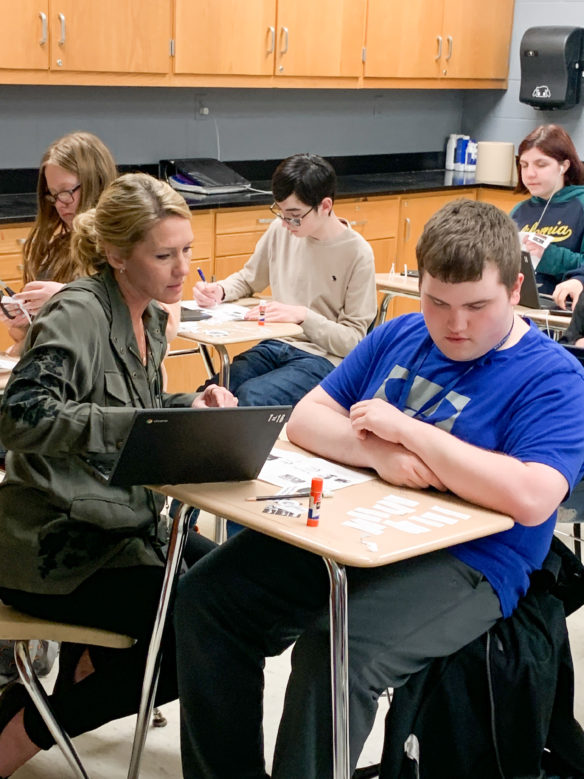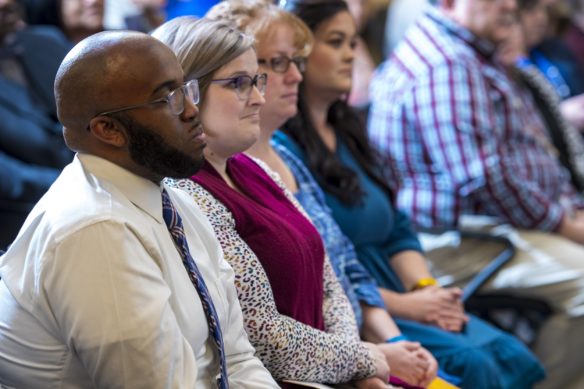
Tara Turner, a science teacher at Monroe County High School, works with student Austin Biggerstaff during a freshman science class. Turner is one of eight teachers in the Monroe County schools to be part of Kentucky’s most recent class of 219 National Board Certified Teachers. The district’s participation in the National Board Professional Learning Schools program has led to an increase in the number of candidates for certification.
Photo by Teresa Emmert
- The pilot program provides participating schools with professional learning grounded in the principles of the National Board for Professional Teaching Standards.
- Twenty schools are participating in the program, including every school in two districts.
By Mike Marsee
mike.marsee@education.ky.gov
Teresa Emmert was one of the first National Board Certified Teachers in Monroe County, but now she has plenty of company.
A program in place in the district could lead to more of her colleagues earning certification from the National Board for Professional Teaching Standards (NBPTS) in the next few years.
All five of the district’s schools are participating in the National Board Professional Learning Schools (NBPLS) program, which is designed to elevate the level of teaching in participating schools and also could increase the number of National Board Certified Teachers (NBCT) in those schools.
The program supports schools that are dedicated to ensuring accomplished teaching for all students and are willing to made systemic changes using NBPTS resources. It was launched in Kentucky in the 2017-2018 school year through the Kentucky Network to Transform Teaching and is now sponsored by the Kentucky Department of Education (KDE).
“Our teachers work really hard and focus on the right things. We were asking, ‘How do you help those teachers grow even more?’ and we feel like this is a way we can help them get even better,” said Emmert, who oversees the program in Monroe County through her work as the district’s coordinator and coach for the Striving Readers Comprehensive Literacy Discretionary Grant Program.
In Kentucky, the NBPLS pilot program provides schools with professional learning grounded in the principles of the National Board. As stated in a KDE fact sheet, NBPL schools:
- Ensure that every student has teachers who see them, ignite their passions and advance their learning;
- Ground professional learning and instructional decisions in the National Board standards and related resources;
- Engage in cycles of continuous improvement;
- Practice distributed leadership and shared ownership over student learning;
- Embrace public teaching practice and innovation; and
- Support relevant, sustained, job-embedded collaborative learning.
The program is in place in 20 Kentucky schools. Monroe County which is one of two districts – along with Menifee County – in which every school is participating in the pilot program, according to Jocelyne Waddle, a consultant in KDE’s Office of Educator Licensure and Effectiveness who oversees the program.
It does not require schools to have one or more National Board Certified Teachers to participate, but Waddle said it is leading to an increase in NBCTs and NBCT candidates in some of the participating schools.
“This is a step forward to demystify what National Board certification is,” Waddle said. “When everybody’s involved in the work and working with National Board resources, they realize that it is attainable.”
NBCT numbers are on the rise in Monroe County, where Emmert said eight teachers were among the most recent class to be certified in December and recognized Feb. 11 at a ceremony in Frankfort. That gives the district a total of 14 NBCTs in areas ranging from early childhood to special education to high school, with at least one in each of its five schools.
“That’s huge for a small district,” she said.
And more are on the way.
“We had almost 30 candidates for National Board last year. We have a huge cadre of teachers working on National Board certification,” she said.
At the district level, Monroe County has earmarked money in its budget to pay for NBCT candidates’ registration fees and for the cost to attempt each of the four required components.
Tara Turner, who teaches freshman science and integrated science at Monroe County High School, earned National Board certification in December. She had been interested in certification before and didn’t pursue it, but the district’s offer made it “a no-brainer” for her because of the opportunity to attain Rank I certification. Kentucky NBCTs holding Rank II certificates are eligible to apply for Rank I certification.
“There were several other teachers in my building and in the district that were going to go through the process, so I knew that I was going to have that support system,” Turner said. “I wouldn’t have been able to pass without that.”
She said going through the certification process had a positive impact on her work in the classroom.
“It makes you a more reflective teacher, just in the choices that you make,” Turner said.

Marcus Blakeney, a mathematics teacher at Fern Creek High School (Jefferson County), and Traci Blanford, a family and consumer sciences teacher at Washington County High School, join other new National Board Certified Teachers (NBCTs) at a recognition ceremony in Frankfort. The 219 teachers who were certified in December give Kentucky the fifth-largest class of NBCTs in the nation this year.
Photo by Marvin Young, Feb. 11, 2020
There are 219 newly certified teachers in Kentucky this year, giving the state the fifth-largest class of NBCTs in the nation this year. Kentucky has a total of 4,007 NBCTs, which accounts for 9.53% of the teaching workforce, the sixth-highest percentage in the nation. There are another 600 candidates going through the process, which they have three years to complete.
In the NBPLS pilot, teachers who aren’t pursuing certification still benefit from the National Board resources being used at their schools.
“What they really like is that they realize it’s not something extra, it’s something that blends with what they are already doing in professional learning as a teacher. They’re just taking it a step farther, going deeper into it,” Waddle said.
Emmert said the program has been more meaningful to teachers in Monroe County than previous professional development.
“A lot of times when teachers complete their professional growth plan in August, it’s just a piece of paper, it’s for compliance, and they don’t look at it again until May,” she said. “They really look at this and document it each month. It’s really making them more intentional. They’re reflecting about their practices, reflecting about student work.”
Turner said she thinks the entire faculty has benefited from the pilot.
“Everybody in our school is on board now. I was part of the first cohort, and now the rest of the staff is going through it and we are acting as mentors to them,” Turner said. “Even the ones that do not need a rank change would benefit from this. It’s not stuff that teachers don’t already do; it takes what you already do and the choices you make and it puts them together in a little better package.”
Waddle said NBPL pilot schools have benefited from the use of common language to discuss complex teaching strategies.
“It’s unifying and retention is also affected,” she said. “National Board teachers have a tendency to stay, particularly at high-performing schools. Nationally, we know that 90% of National Board teachers stay in the classroom compared to 60% nationwide.”
Principals lead the program in each school, and Waddle said principal buy-in is the only prerequisite for a school’s participation.
Emmert said the principals of each Monroe County school has chosen to focus on particular areas of emphasis within the National Board resources. For example, Monroe County High School is focusing this year on reflection, one of the National Board’s Five Core Propositions.
“They have focused on teacher reflection all year, and we have monthly PLCs (professional learning communities) in teacher content groups,” she said. “It’s a very organized process.”
MORE INFO …
Teresa Emmert teresa.emmert@monroe.kyschools.us
Tara Turner tara.turner@monroe.kyschools.us
Jocelyne Waddle jocelyne.waddle2@education.ky.gov




Leave A Comment